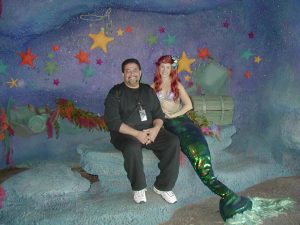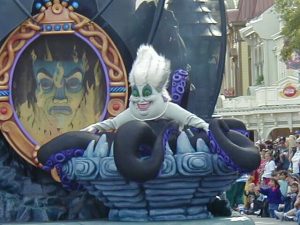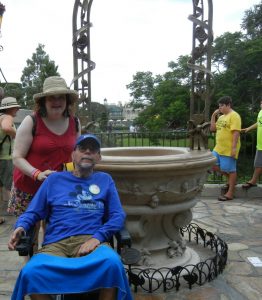Happy Anniversary “The Incredibles 2”: Tapping Our Super Powers in Caregiving and Grief
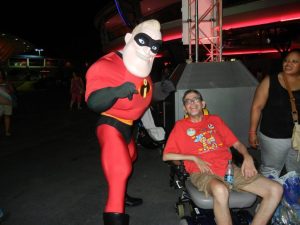
July 2014 at Walt Disney World
Today marks the one year anniversary of the release of Disney’s The Incredibles 2. The Incredibles hold a particular place in my heart because Mr. Incredible was one of Ben’s top three Disney buddies, along with Buzz Lightyear and Sully.
Because of this, and since it was our tradition, it was especially important to me to see the film on opening day. I remember that I had my little cry in the theater as the film began. Where I usually feel Ben’s presence at these films, at this film I profoundly felt his absence. I was angry that he did not have the chance to see this movie. Grief had brought a lot of emotions, but until this point, I can’t say that I had felt anger, despite often feeling frustrated that he was cheated of so much of life. I went on to feel more anger later in the summer when I visited the Georgia Aquarium, another place that Ben would have loved. There are certainly more profound life moments that Ben is missing and will miss that I should probably be more angry about, but sometimes the little moments make a tremendous impact.
In the past year, there have been more Disney films. Each one comes with sadness and acknowledgement of Ben’s physical absence but spiritual presence. However, I have also seen some growth in my perspective and experience with grief. I have noticed that I no longer debate with myself whether I can and should enjoy myself. The experiences are a time to focus thoughts on Ben and good memories. This seems to, on some level, alleviate the deep sadness and loneliness. It’s respectful of him and maintains the Disney bond that was such a strong part of our relationship.
This blog is a clear reflection of the way I look to each Disney film for enlightenment, and hopefully a quote that will carry me forward or give me perspective. I like to be able to share these thoughts with other caregivers with the intention that they will validate, inspire or comfort. The Incredibles 2 did not disappoint. The film actually has a lot of messages about inclusion, diversity, fighting for justice, family and love. I do remember the audible expressions of agreement when Dicker said, “Politicians don’t understand people who do good things. That makes them nervous.“
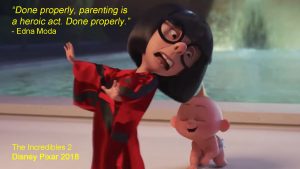
Interestingly, the quote that resonated with me was very appropriate for caregivers, and for an opening weekend that included Father’s Day. Edna Moda told Mr. Incredible, “Done properly, parenting is a heroic act. Done properly.” I was so fortunate to have had two devoted and loving parents. As a public school teacher, over the years I have seen many children who are not parented properly, in fact, they are barely parented at all. Good parenting is indeed a heroic, selfless act of love. The same came be said for good caregiving.
As a caregiver, I often questioned my abilities, especially when I was struggling with exhaustion, sadness and patience with Ben when he was stubborn and demanding. But, like any other caregiver, I put my emotions and feelings aside, or, at least on hold, and trudged on because the immediate needs of caregiving are not negotiable. Phone calls abruptly ended, activities were thrown to the side, chores ignored (well, I can’t say I minded that very much) as I attempted to create order amidst chaos, calm when he was panicked, and peace amidst the devastation of watching Ben deteriorate and suffer, physically and/or emotionally. Like all caregivers, I also ran interference among medical professionals and other related staff, as well as family and friends. I provided spirit boosts and levity and also administered difficult doses of reality, as tactfully as possible.
It certainly wasn’t my goal as a caregiver to be heroic and I don’t think that caregivers generally perceive themselves as heroes. We probably spend more time following Dory’s advice to “just keep swimming.” As a crybaby, I’ve never seen myself as heroic- at any point in my life- which is why, I think, I was puzzled when people told me that I was brave. Ben was brave, I was along for the ride, trying to be helpful and, a good deal of the time, not sure if I was much of a success. My insecurities made me feel much less than a superhero. However, I can attest that I definitely earned the Wonder Woman t-shirt Ben got me after I managed to grab him and keep him from falling off the bed!
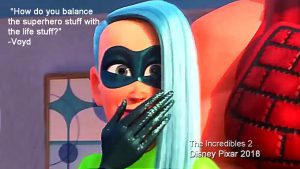
In the film we are introduced to new super hero, Voyd, who asks Mrs. Incredible/Elastigirl, “How do you balance the superhero stuff with the life stuff?” Indeed, that’s a very important consideration for caregivers. For me, I constantly struggled with balancing the responsibilities of caregiving against a full-time job, daily life chores, relationships with friends and family, the emotional strain of losing the life Ben and I had, and knowing that ultimately, I was going to lose Ben. In retrospect, I think the balancing act IS the superhero stuff.
Young Dash tells his dad, Mr. Incredible, that he wants to fight bad guys because “It defines me.” I can say that caregiving defined me for several years and I found that it is a significant part of who I am and how I see myself. I have written about how I floundered when I was no longer a caregiver, until I found myself again through blogging, volunteering and trying to support other caregivers. Although I would rather not have discovered this through the illness and loss of my dad and Ben, I feel like I have identified caregiving as my super power. Unfortunately, I was not able to defeat cancer or ALS, but my dad and Ben always felt cared and advocated for and loved, and that is incredibly powerful. I did not see it while I was actively caregiving, but time and distance have provided valuable perspective.

Mr. Incredible at Walt Disney World’s parade, 2014.
Mr. Incredible summed up well the life of a caregiver when he said: “How do I do it? By rolling with the punches, baby!” I can picture Ben smiling and nodding, because, in actuality, both he and I rolled with the punches. I am still in awe of how well he rolled with the severe punches dealt to him by ALS. I guess we were both super heroes, albeit without the cute costumes.
I highly recommend The Incredibles 2. It’s quite fun and fantastic and offers unexpected words of wisdom for caregivers and everyone else. Post your thoughts! I look forward to reading them.
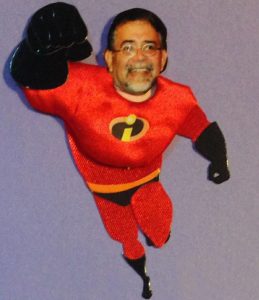
Ben as Mr. Incredible- Part of a birthday collage that I made for Ben. When it came to battling ALS, Ben was indeed a super hero!




